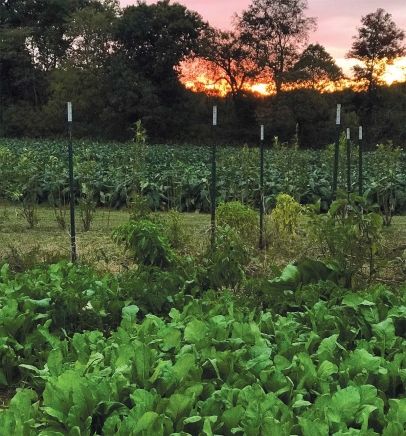That Which Sustains
Mamma died this spring. She was our true center. Since that unexpected horrific day, Daddy and I have been finding our way to a new center, whatever that really means.
Daddy asked that I invite some friends over for dinner on the patio before summer inevitably ushers all that comes with the growing season — bugs, weeds and critters of all kinds.
So, I called up a few dear souls who have lovingly held our hands through this new season and invited them for an al fresco feast of sorts. They were happy to bring some of their favorites to round out the meal. That’s how folks out here do grief.
The weather had called for a small band of rain to move in after midnight. As the sun set, the clouds had already moved in.
I had plucked some of last year’s final remains from the freezer with Mamma’s cursive “Blackberries 2020” scrolled atop the Ziploc, cooked them down into a velvety, deep purple syrup, and drizzled them atop Daddy’s favorite, vanilla ice cream.
Just as we had pushed back from the table, bellies full of special occasion foods from our families' larders, a John Deere’s headlights pierced through the darkness. We slurped the last little bit of melted ice cream, which in my humble opinion is the best part, and surmised the notions of the tractor’s driver. He needed to disc up our back 11 acres before it rained, so that next week he could set the tobacco.
“As long as you own a patch of land, you’ll never go hungry.” This mantra continues to reside in my life’s narrative, even today. It came from Grandaddy, who worked the land his father worked so hard to retain. Daddy never smoked a day in his life. But, by golly, he also grew tobacco, as it was and is an integral part of agricultural economics here in the South. Like it or not, tobacco crops feed farm families with the extra income it brings to the table. And, in turn, it feeds you. After all, it’s the farmers who grow your food.
While I could sit back on my high horse and spin a tale of how this sticky nightshade isn’t harming people, that would be an outright lie.
That farmer working until the wee hours of night? He farms pretty much all the land out this way yet is barely keeping his head above water. Even still, he is a fine steward indeed.
Earlier this spring, the USDA announced an investment of $92.2 million in grants for local and regional producers affected by the pandemic. “Ha!” I thought as I read the press release that to this day sits in my overfilled inbox, “Show me one farmer not affected by such an awful time in history.”
I recently texted this announcement to our fine steward. I doubt he’ll even have time to consider the lengthy application process for such meager funds, let alone all the hoops he’d be asked to jump through for such. “We have an opportunity to transform our nation’s food system with a greater focus on resilient, local and regional food systems,” said Agriculture Secretary Tom Vilsack. With an estimated 896 million acres of American farmland, well, you do the math.
What's more, new inheritance tax bills currently on the floor threaten small family farms such as ours. Undoubtedly, small farming families have never possessed such a deep financial well to continue at this rate and to keep what their ancestors sacrificed greatly for all of us, not just the land owners.
Years ago, Grandaddy was forced to give up some of his inheritance for Americans to drive our cars at an affordable price. The pipeline left its indelible mark upon the pristine pastures throughout these parts for pennies on the dollar.
When we consider sustainability in today’s market, it’s examples like these that prove the very hands that are tasked with responsible stewardship face a continued crisis of unimaginable magnitudes.
With positive shifts, change and newly embraced personal accountability, America finally seems to be waking up from such a historically shortsighted mentality. That’s an absolute good thing. But, it comes with a pretty hefty price tag — a price that if we aren’t able or willing to soon find a new way of paying, sustainability won’t even have a seat at the kitchen table.





